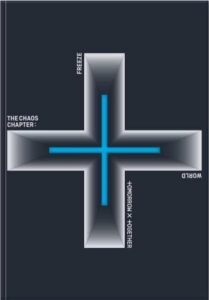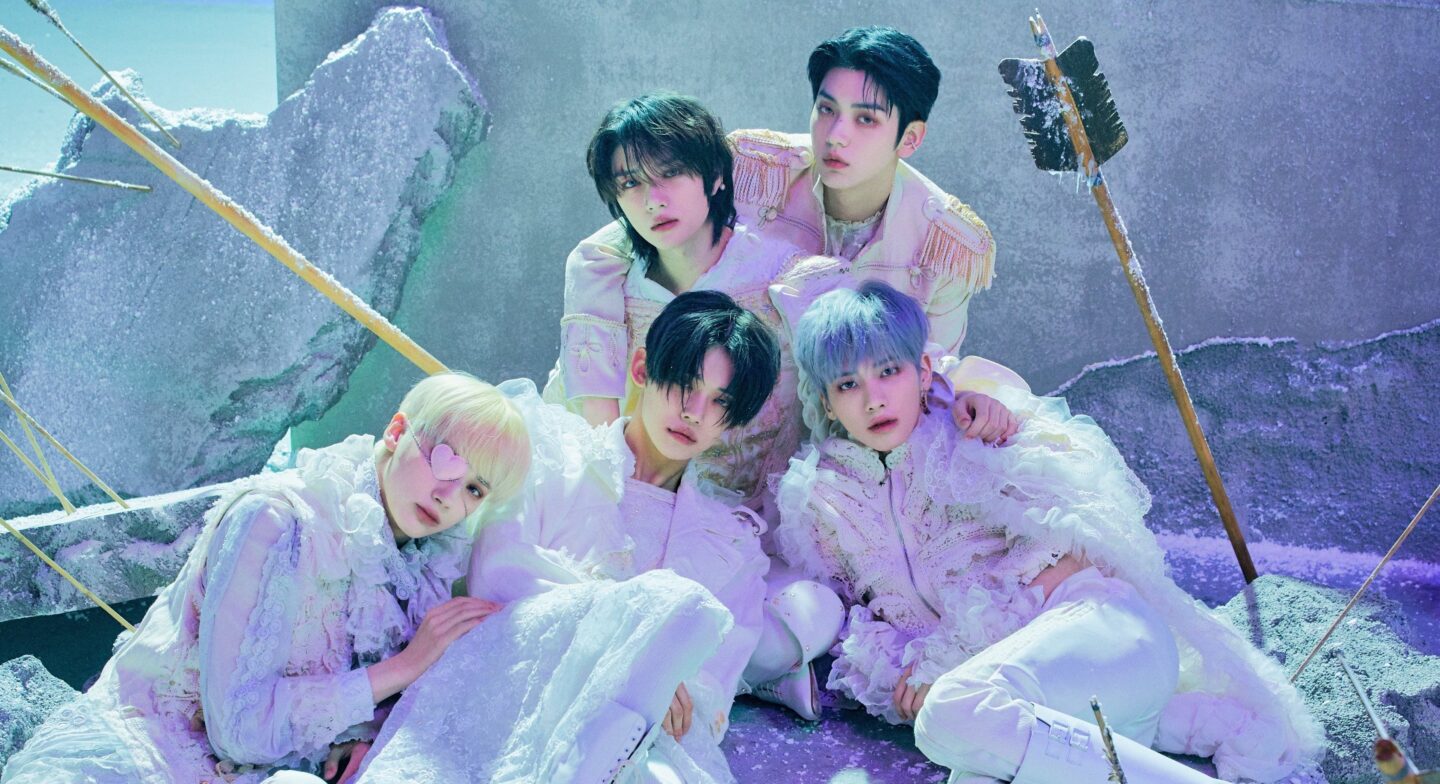
After their extensive exploration of youth in The Dream Chapter, TXT finally branch out of their comfort zone in The Chaos Chapter: Freeze, although not in the way some fans might think.
Indeed, TXT stray from their polished pop roots in Freeze and experiment with wildly different styles and vocals. They also tackle more mature topics like romantic love, showcasing increased creative autonomy, claiming credits in most of the album’s songs.
However, in an ironic turn, Freeze itself is largely about being stuck. They sing about their inability to progress in a lot of the tracks, and in even others, they bring up and question their previous work instead of moving forward with new material. Inundated with responsibilities, expectations, and the advancement of their peers, the boys of TXT are rendered frozen.
This contrast between TXT’s growth as artists and the arrested development they tackle in the album can be quite confusing at times; listening to Freeze, one feels for their deep misery, only to be bowled over by the freshness of their sound. But more than anything, this contrast makes for a fascinating and sympathetic record.
With Freeze, TXT put out a timely, comforting message without sacrificing their craft. It may do little to move the group’s narrative journey, making it a not-so-ideal start to an all-new chapter, but at the very least it shows that the boys are moving forward, not as characters or lyrical personas, but as musicians and as themselves.
We first see this hesitance to progress in “Anti-Romantic,” an amorous and poignant ballad about the boys’ insecurities on love. Backed with a sparse but strong beat, the boys announce that they would rather cut a blossoming relationship short if it meant more pain and heartache down the road.
This restrain carries on in “Ice Cream,” a synth-pop track co-written by Soobin. Here, TXT try to exemplify what frozen growth looks like by using themselves as an example. The song touts the same youthful sound and imagery TXT employed in albums past, and like “Blue Orangenade” and “Popping Star” before it, “Ice Cream” invites the listeners to see past the dessert’s sweet deceit.

Unlike its precedents, however, “Ice Cream” is more cynical. TXT compare happiness to ice cream, gratifying but fleeting, and claim that their “slightly mean wish” is for the world to be just as unhappy as they are.
They continue to allude to their previous work in “What if I had been that PUMA” and “No Rules,” this time in more profound and comical ways.
In “What if I had been that PUMA,” TXT cheekily ask each other “would you rather?” questions as a way of mulling over their past dilemmas and distancing themselves from present worries. They call back to “PUMA” when they wonder, “Would you have stayed in the zoo or run away?” and to “Can’t You See Me?” when they ask, “Choose, believer or saver?” Even “Run Away” gets a mention in the lyric, “There is a sense of freedom, run away!”

What begins as light-hearted reflection, however, quickly turns into an intense interrogation. They are overcome by “What If” possibilities and, again, choose to do nothing—not even play the game—amidst growing pressure. They sing:
There is no correct answer, why should I decide?
Falling into a dilemma, I fall again
I can’t live low-key like this
Stop, my head is already overloaded
In classic TXT fashion, the dark lyrics, which Beomgyu, Taehyun, and Yeonjun help composed, are offset by an upbeat tempo, this time with more hip-hop than they’ve previously sampled. Some vocals are heavily processed while others remain unaltered, emphasizing their rabid questioning and increasing panic in the song.

The same feeling of helplessness pervades “No Rules,” an electro-disco number co-penned by Hueningkai, Beomgyu, Taehyun, and Yeonjun. In a funny and relatable turn, they each confront their seeming naivety in “New Rules,” where they wished to live the “punk” and reckless life. Now, they ask rather shamefully, “Why did I want to be a punk? Did I just become a real idiot?”
By now, it’s understandable to see all this self-reference as TXT reverting to their comfort zone and being creatively lost, as if they are unable to spin new material for what is supposed to be an entirely new chapter. But Freeze doesn’t seem interested in moving forward. It’s more likely the album was intended to be a sympathetic, realistic deep-dive into what actual growth looks like: slow and unsure, with many pit stops, setbacks, and cringe fests along the way.

Fortunately, we still get to see a significant amount of growth via TXT as musicians. Moving on from content to form, it’s apparent in “Ice Cream,” “What if I had been that PUMA,” and “No Rules” that TXT have become much more comfortable with composing their own lyrics and trying out new genres.
Hip-hop, in particular, is not something the boys often take on, and even when they do it’s usually laced with good old pop. But the genre can be found all over Freeze, more so than in previous records, and the boys challenge themselves to much success.
Another example, and the most prominent one, comes in the form of “0X1=LOVESONG (I Know I Love You),” an emo-rock anthem that takes the group to new, musical heights. The boys have experimented with rock before, but never have they been this aggressive and anguished. It’s a richly textured single, thanks in large part to the use of live instruments, raspy vocals, and sharp lyrics. Seori joins them in the chorus, adding a nice dash of sweetness in the angst-ridden track.

“Dear Sputnik” also sees TXT play with the rock genre (an increasingly good look for the group, more so than hip-hop), though it contains more of a pop than grunge undertone. Co-produced by Hueningkai, the track swells with great emotion and welcomes the return of the boys’ sonorous, raw vocals.
“Frost” is the final track on Freeze, and here, all of TXT’s self-imposed stillness and repressed feelings do not bolster them to move, but rather, it implodes them into chaos. “Frost” combines all the genres used in the album, from heavy rock to disco to hip-hop, and the result is an eerie amalgam that fittingly highlights the group’s futility.
Now, for those who tune in for plot as much as they do sound, Freeze may not be as exciting as TXT’s previous albums. The group built a rich world with the TXT Universe, but Freeze’s concept literally necessitates the boys to stay still and not go anywhere.
Moreover, notions of being stuck have already been explored, albeit briefly, in the past, namely in songs like “Can’t We Just Leave the Monster Alive?” and “PUMA,” so as a result, Freeze tends to feel more like an epilogue (or even just a footnote), instead of an entirely new chapter in TXT’s storyline.
But for those who don’t care much for world-building, Freeze is a sublime standalone album. It proves that the group is capable of bursting out of their pop shell, and it gives us a taste of what a purely TXT-helmed album could sound like: rougher and rawer while continuing the tradition of idiosyncratic, heartfelt lyrics.
Freeze is also a kind album. It recognizes a particular kind of growth—a slower, more unsure one—and commits itself to it, all while giving us a glimpse of what overcoming it could like, via the five boys hard at work behind it.



